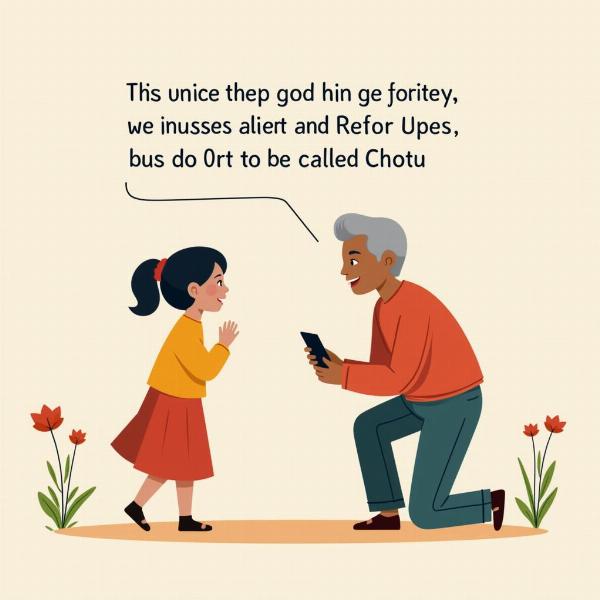Chotu, a common nickname in Hindi, carries a wealth of cultural nuances. Understanding its meaning and usage can provide valuable insight into Indian social dynamics and familial relationships. This article delves into the various interpretations of “chotu meaning in hindi,” exploring its origins, connotations, and regional variations.
Unpacking the Meaning of Chotu
The most literal translation of “chotu” in Hindi is “small” or “little.” It stems from the Hindi word “chhota” (छोटा), which denotes smallness in size or age. However, its meaning extends beyond mere physical attributes. Chotu is often used as a term of endearment for younger siblings, children, or even pets. It signifies affection, protectiveness, and a sense of familiarity.
Chotu as a Nickname
In many Indian families, “chotu” transcends its literal meaning and becomes a beloved nickname. It’s not uncommon for someone to be called “chotu” throughout their life, even into adulthood, especially by older relatives. This continued use highlights the enduring bond within the family and the persistent perception of the individual as the “younger one.”
Regional Variations and Contextual Usage
While the core meaning of “chotu” remains consistent, its usage can vary slightly across different regions of India. In some areas, it might be used more casually, while in others, it carries a stronger sense of affection. Context also plays a crucial role. The tone of voice and body language accompanying the use of “chotu” can significantly influence its interpretation.
Chotu in Popular Culture
The term “chotu” has even permeated popular culture, appearing in movies, songs, and everyday conversations. This widespread usage reinforces its familiarity and acceptance within Indian society.
Beyond the Literal: Connotations of Chotu
“Chotu” can also sometimes be used in a slightly condescending way, implying a lack of experience or maturity. However, within a family setting, this connotation is usually absent, replaced by warmth and affection.
Is Chotu a Gender-Specific Nickname?
While “chotu” is more commonly used for boys, it can also be applied to girls, especially in informal settings. However, there are other, more commonly used endearing terms for girls, such as “choti” (छोटी – feminine form of chhota) or “gudiya” (गुड़िया – meaning doll).
What if I Don’t Like Being Called Chotu?
If you find the nickname “chotu” uncomfortable, politely communicating your preference to family members is usually the best approach. Explaining your reasoning can help them understand your perspective.
 Chotu Expressing Preference
Chotu Expressing Preference
Conclusion: The Endearing Nature of Chotu
“Chotu meaning in hindi” encapsulates more than just its literal translation of “small.” It represents a rich tapestry of familial affection, cultural nuances, and social dynamics. While its usage can vary, its core essence remains – a term of endearment that signifies a close bond.
FAQ:
- What is the literal meaning of “chotu”? The literal meaning is “small” or “little.”
- Is “chotu” always used affectionately? Mostly yes, especially within families. However, it can sometimes have a slightly condescending connotation in other contexts.
- Can “chotu” be used for girls? While more common for boys, it can be used for girls in informal settings.
- What are other similar nicknames in Hindi? Similar nicknames include “choti” (for girls) and “bachcha” (meaning child).
- Is it okay to ask someone not to call me “chotu”? Yes, politely communicating your preference is perfectly acceptable.
Meaning-Hindi.in offers expert Hindi translation services, specializing in various fields, including business, legal, technical, website localization, and academic translations. We provide accurate and culturally sensitive translations to bridge communication gaps. Need help with Hindi translations? Contact us at [email protected] or call us at +91 11-4502-7584. Meaning-Hindi.in is your trusted partner for all your Hindi translation needs.